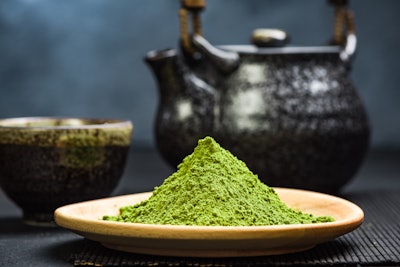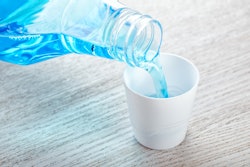
A mouthwash containing matcha, a finely ground powder of green tea, may inhibit the growth of one of the main bacteria involved in periodontitis, indicating that it may be used to prevent and treat gum disease. The study was published on May 21 in Microbiology Spectrum.
Patients with gum disease who gargled with a matcha mouth rinse had significantly less Porphyromonas gingivalis (P. gingivalis) in their saliva, the authors wrote.
"Our findings may pave the way for a promising, novel therapeutic option of using matcha for treatment to treat patients with periodontitis," wrote the authors, led by Dr. Ryoma Nakao of the National Institute of Infectious Diseases in Tokyo.
Matcha, an intensely hued green tea, has long been studied for its possible use in combating viruses, fungi, and bacteria. Though matcha was not the specific tea used, in 2018, patients with plaque-induced gingivitis who rinsed with a green tea-based mouthwash had plaque and gingival markers similar to those who gargled with chlorhexidine.
To explore the potential of matcha in treating and preventing periodontitis, a matcha extract solution was applied to 16 oral cavity bacteria species, including three strains of P. gingivalis, in the lab.
Within two hours, nearly all P. gingivalis cells had been destroyed by the matcha extract, and all cells were dead after four hours. This effect suggests that matcha interfered with the growth and expends bacterial activity, the authors wrote.
Then, a trial was conducted using 45 people with gum disease. Participants were separated, with one group receiving matcha powder, another receiving a barley tea powder, and the third that was given a powder containing the anti-inflammatory sodium azulene sulfonate hydrate. The participants prepared the mouthwash by dissolving the powder into water and gargling with it twice daily for a month. Oral exams were completed, and saliva samples were collected before and after they began using the mouthwashes, the authors wrote.
Based on lab tests, those who used the matcha mouthwash had a dramatic reduction in levels of the periodontal disease-causing bacteria. A reduction in the bacteria was observed in the groups that rinsed with the anti-inflammatory or barley tea powders, they wrote.
However, the study had limitations, including that the matcha was only tested via mouthwash. It is not known to what extent the use of mouthwash, in general, reduces bacteria in the oral cavity.
Using another delivery method, like injecting matcha directly into periodontal pockets, was not tested, the authors wrote. Additionally, a larger scale clinical trial of topical matcha is necessary to validate its clinical efficacy and benefit to patients with gum disease, they wrote.
"Results suggest prophylactic and therapeutic potential for matcha as a multimodal drug for periodontal diseases," Nakao and colleagues wrote.




















